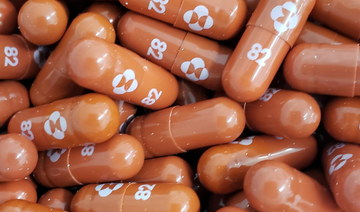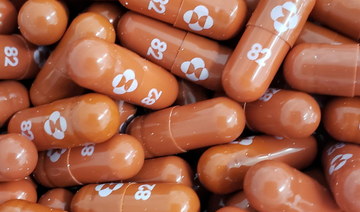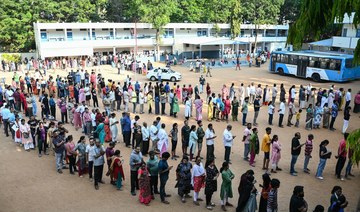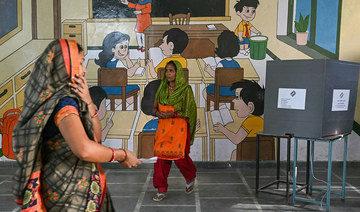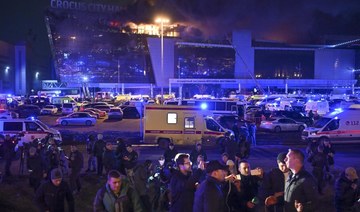DUBAI: Britain on Thursday became the first country in the world to approve a potentially game-changing COVID-19 antiviral pill jointly developed by US-based Merck and Ridgeback Biotherapeutics, in a boost to the fight against the pandemic.
Britain’s Medicines and Healthcare products Regulatory Agency (MHRA) recommended the drug, molnupiravir, for use in people with mild to moderate COVID-19 and at least one risk factor for developing severe illness, such as obesity, older age diabetes, and heart disease.
It will be administered as soon as possible following a positive COVID-19 test and within five days of the onset of symptoms, the regulator said, citing clinical data.
The green light is the first for an oral antiviral treatment for COVID-19 and the first for a COVID-19 drug that will be administered widely in the community. US advisers will meet this month to vote on whether molnupiravir should be authorized.
Treatments to tackle the pandemic, which has killed more than 5.2 million people worldwide, have so far focused mainly on vaccines. Other options, including Gilead’s infused antiviral remdesivir and generic steroid dexamethasone, are generally only given after a patient has been hospitalized.
Merck’s Molnupiravir has been closely watched since data last month showed it could halve the chances of dying or being hospitalized for those most at risk of developing severe COVID-19 when given early in the illness.
Molnupiravir, which will be branded as Lagevrio in Britain, is designed to introduce errors into the genetic code of the coronavirus that causes COVID-19 and is taken twice a day for five days.
Professor Stephen Powis, national medical director for the National Health Service (NHS) in England, said the drug would be administered to patients at higher risk of complications as Britain heads into one of the most challenging winters ever.
A wider rollout will follow if it is clinically and cost effective in reducing hospitalizations and death, he added.
“We are now working across government and the NHS to urgently get this treatment to patients initially through a national study so we can collect more data on how antivirals work in a mostly vaccinated population,” UK vaccines minister Maggie Throup told parliament.
The speedy approval in Britain, which was also the first Western country to approve a COVID-19 vaccine, comes as it struggles to tame soaring infections.
Britain has about 40,000 daily cases of COVID-19, according to the latest seven-day average. That is second only to the roughly 74,000 a day in the United States, which has five times more people, and has fueled criticism of the government’s decision to abandon most pandemic-related restrictions
Data released on Wednesday night showed COVID-19 prevalence in England hit its highest level on record last month, led by a high numbers of cases in children and a surge in the south-west of the country.
Pressure is growing on the government to implement its “Plan B” aimed at protecting the NHS from unsustainable demands, involving mask mandates, vaccine passes and work-from-home orders.
Many other big economies, including Germany, France and Israel, have either retained some basic COVID-19 measures like mask mandates or reintroduced them in response to rising cases.
The UK government has said its focus remains on administering vaccine boosters and inoculating 12 to 15-year-olds.
“With no compromises on quality, safety and effectiveness, the public can trust that the MHRA has conducted a robust and thorough assessment of the data (on molnupiravir),” MHRA chief June Raine said in a statement.
Last month, Britain agreed a deal with Merck to secure 480,000 courses of molnupiravir.
Professor Penny Ward, an independent pharmaceutical physician, welcomed the approval, but said the NHS needed to outline its plans for rollout and cautioned that supplies were likely to be tight given the strong global demand.
“Comments made by Javid today suggest that it may be made available via a clinical trial, presumably to investigate its effectiveness in vaccinated patients with breakthrough infections, as the original study incorporated unvaccinated adults,” she said.
If given to everyone becoming unwell, the nearly half a million courses would not last very long given the more than 40,000 current daily case rate, she said.
In a separate statement, Merck said it expected to produce 10 million courses of the treatment by the end of this year, with at least 20 million set to be manufactured in 2022.
The US based drugmaker’s shares were up 2.1 percent at $90.54 before the market open.
Pfizer and Roche are also racing to develop easy-to-administer antiviral pills for COVID-19. Pfizer last month began a large study of its oral antiviral drug for the prevention of COVID-19 in people exposed to the coronavirus.
Merck’s molnupiravir is also being studied in a late-stage trial for preventing infection.
Viral sequencing done so far has shown molnupiravir is effective against all variants of the coronavirus, Merck has said, including the more-infectious Delta, which is responsible for the worldwide surge in hospitalizations and deaths recently.
While it is not yet clear when Merck will deliver doses to Britain, the company has said it is committed to providing timely access to its drug globally with plans for tiered pricing aligned with a country’s ability to pay.
Merck is also in talks with generic drugmakers about expanding manufacturing licenses to build supply of the treatment.
Antibody cocktails like those from Regeneron and Eli Lilly have also been approved for non-hospitalized COVID-19 patients, but have to be given intravenously.
Britain approves Merck’s COVID-19 pill in world first
https://arab.news/yzgfd
Britain approves Merck’s COVID-19 pill in world first
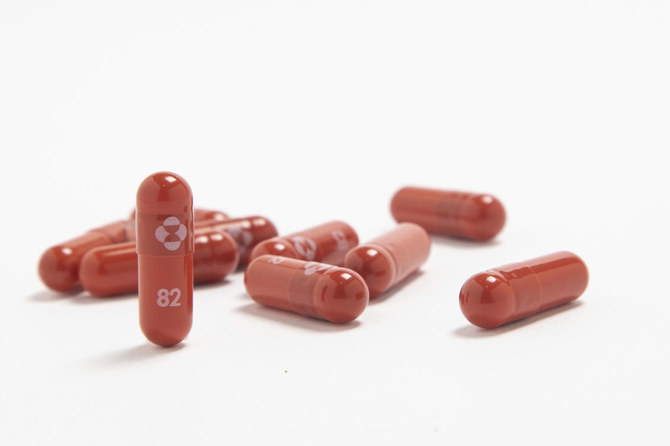
- Britain's Medicines and Healthcare products Regulatory Agency recommended the drug, molnupiravir, for use in people with mild to moderate COVID-19
- The green light is the first for an oral antiviral treatment for COVID-19
Voter turnout slumps, Modi ‘wave’ missing from India’s 2024 polls
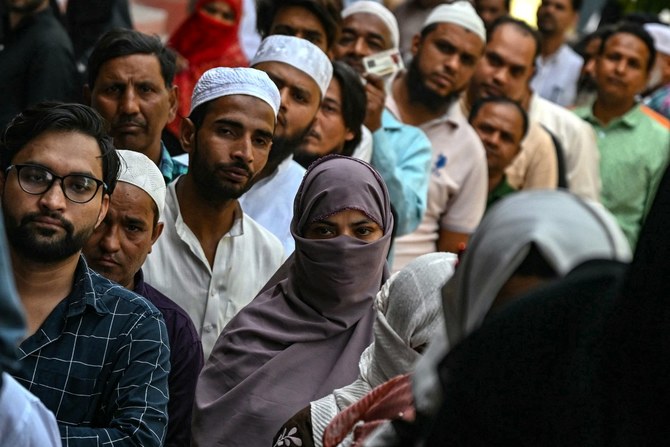
- India’s general election started on April 19 and is taking place in seven phases till June 1
- Voters are battling extreme temperatures as parts of India gripped by heatwave
NEW DELHI: Voter numbers have slumped in the first and second phase of India’s general election, with experts saying that the “wave” of enthusiasm that brought incumbent Prime Minister Narendra Modi to power in 2014 was no longer present in the ongoing polls.
More than 968 million people have been registered to vote in the world’s biggest general election, in which Modi and his Hindu nationalist Bharatiya Janata Party are aiming for a rare third consecutive term in power.
The first phase of voting was on April 19 and the polls are taking place over six weeks, with results expected on June 4.
India has a total of 28 states and eight federally governed territories. Some regions complete the process on a single day, while others spread it out over several phases.
The second phase was on April 26 and the other voting dates will be May 7, May 13, May 20, May 25 and June 1.
Friday’s turnout was estimated by the Election Commission of India at 61 percent — compared with 68 percent in the second phase five years ago. In the first phase, it was 65 percent against nearly 70 percent in 2019.
The lower turnout showed “apathy toward politics,” D. Dhanuraj, chairman of the Kerala-based Center for Public Policy Research, told Arab News.
“I think it is clear now that there is no wave in favor of any party as such. In 2014, there was a wave, in 2019 there was a wave,” he said, referring to the enthusiastic pro-Modi balloting in the past two general elections.
“(In) 2024, there was a talk that there was a wave, but I think it is becoming clear that there is no such wave, no wave that would give exponential majority in the parliament to any party.”
Modi and his BJP-led National Democratic Alliance are challenged by an alliance of two dozen opposition parties — the Indian National Developmental Inclusive Alliance, or INDIA — led by the Congress party, which has ruled the country for close to 45 years since independence in 1947.
Congress plunged to a historic low when it was swept out of power by the BJP in the 2014 and 2019 general vote, and won its second-lowest number of 52 seats in 2019, when Modi’s party enjoyed a landslide victory, winning 303 out of 543 seats in the lower house of parliament.
The party or coalition that wins at least 272 parliamentary seats forms the government.
In 2024, Modi has been aiming for 400 seats for the National Democratic Alliance led by his BJP. But the target, often cited ahead of the first phase, has not been repeated.
Although pre-poll surveys suggested Modi would easily win, it is no longer projected to be a landslide as in in the two previous elections.
“It was the electoral rhetoric of the BJP to cross 400 seats, but this reality is not happening, it seems now,” Satish Kumar Singh, political analyst in Delhi, told Arab News.
“The BJP gave that slogan just to galvanize voters. When there is less voting that also means that the BJP might not have a whopping majority, it might be close to a simple majority.”
Another factor deterring voters from standing in long queues at polling stations was the hotter-than-normal summer, with temperatures in some states on Friday exceeding 40 degrees Celsius.
“There is no wave but heatwave in this election,” Singh said. “That is keeping the voters away from the polling booths.”
Not all experts expected the lower turnout to affect the ruling party’s chances in the polls.
“There seems to me no empirical evidence that if voter turnout increases it supports any side — the ruling (party) or the opposition,” said Sandeep Shashtry, political analyst and vice-chancellor of Jagran Lakecity University in Bhopal.
“I think we cannot make a generalization about the wider implications.”
Anti-war protesters dig in as some schools close encampments after reports of antisemitic activity
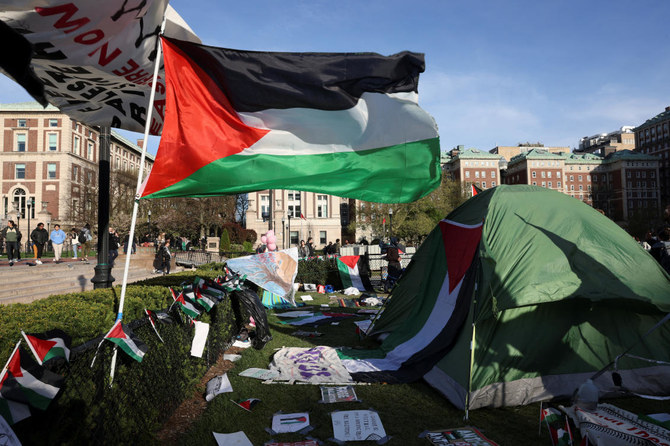
- Protesters nationwide are demanding that schools cut financial ties to Israel and divest from companies they say are enabling the conflict
- Early Saturday, police in riot gear cleared an encampment on the campus of Northeastern University in Boston while several dozen students shouted and booed at them
NEW YORK: As students protesting the Israel-Hamas war at universities across US dug in Saturday and vowed to keep their demonstrations going, some universities shut down encampments after reports of antisemitic activity among the protesters.
With the death toll mounting in the war in Gaza, protesters nationwide are demanding that schools cut financial ties to Israel and divest from companies they say are enabling the conflict. Some Jewish students say the protests have veered into antisemitism and made them afraid to set foot on campus.
Early Saturday, police in riot gear cleared an encampment on the campus of Northeastern University in Boston while several dozen students shouted and booed at them from a distance, but the scene was otherwise not confrontational.
The school said in a statement that the demonstration, which began two days ago, had become “infiltrated by professional organizers” with no affiliation to the school and protesters had used antisemitic slurs.
“We cannot tolerate this kind of hate on our campus,” the statement posted on the social media platform X said.
The University of Pennsylvania took similar action Friday when interim President J. Larry Jameson called for an encampment of protesters on the west Philadelphia campus to be disbanded, saying it violates the university’s facilities policies.
The “harassing and intimidating comments and actions” by some protesters violate the school’s open expression guidelines as well as state and federal law, Jameson said, and vandalism of a statue with antisemitic graffiti was “especially reprehensible and will be investigated as a hate crime.”
“I am deeply saddened and troubled that our many efforts to respectfully engage in discourse, support open expression, and create a community that is free of hate and inclusive for everyone have been ignored by those who choose to disrupt and intimidate,” he said.
At Columbia University, where protesters have inspired pro-Palestinian demonstrations across the country, negotiations continued with those at the student encampment.
The university’s senate passed a resolution Friday that created a task force to examine the administration’s leadership, which last week called in police in an attempt to clear the protest, resulting in scuffles and more than 100 arrests.
Though the university has repeatedly set and then pushed back deadlines for the removal of the encampment, the school sent an email to students Friday night saying that bringing back police “at this time” would be counterproductive.
Decisions to call in law enforcement, leading to hundreds of arrests nationwide, have prompted school faculty members at universities in California, Georgia and Texas to initiate or pass votes of no confidence in their leadership. They are largely symbolic rebukes, without the power to remove their presidents.
But the tensions pile pressure on school officials, who are already scrambling to resolve the protests as May graduation ceremonies near.
California State Polytechnic University, Humboldt, gave protesters who have barricaded themselves inside a building since Monday until 5 p.m. Friday to leave and “not be immediately arrested.” The deadline came and went. Only some of the protesters left, others doubled down. After protesters rebuffed police earlier in the week, the campus was closed for the rest of the semester.
In Colorado, police swept through an encampment Friday at Denver’s Auraria Campus, which hosts three universities and colleges, arresting about 40 protesters on trespassing charges.
Students representing the Columbia encampment said Friday that they reached an impasse with administrators and intend to continue their protest. After meetings Thursday and Friday, student negotiators said the university had not met their primary demand for divestment.
In the letter sent to Columbia students Friday night, the university’s leadership said “we support the conversations that are ongoing with student leaders of the encampment.”
Columbia’s president, Minouche Shafik, faced significant criticism from faculty Friday, but retained the support of trustees.
A report by the university senate’s executive committee, which represents faculty, found Shafik and her administration took “many actions and decisions that have harmed Columbia University.” Those included calling in police and allowing students to be arrested without consulting faculty, misrepresenting and suspending student protest groups and hiring private investigators.
Also Friday, Columbia student protester Khymani James walked back comments made in an online video in January that recently received new attention. James said in the video that “Zionists don’t deserve to live” and people should be grateful James wasn’t killing them.
“What I said was wrong,” James said in a statement. “Every member of our community deserves to feel safe without qualification.”
James, who served as a spokesperson for the pro-Palestinian encampment as a member of Columbia University Apartheid Divest, was banned from campus Friday, according to a Columbia spokesperson.
Protest organizers said James’ comments didn’t reflect their values. They declined to describe James’ level of involvement with the demonstration.
In France, students at the Paris Institute of Political Studies, which counts President Emmanuel Macron among its many famous alumni, students blocked access to a campus building and classes went online as the wave of protests reached overseas.
Police clashed with protesters Thursday at Indiana University, Bloomington, where 34 were arrested; Ohio State University, where about 36 were arrested; and at the University of Connecticut, where one person was arrested.
The University of Southern California canceled its May 10 graduation ceremony Thursday, a day after more than 90 protesters were arrested on campus. The university said it will still host dozens of commencement events, including all the traditional individual school ceremonies.
Universities where faculty members have initiated or passed votes of no confidence in their presidents include Cal Poly Humboldt, University of Texas at Austin and Emory University.
Russia says it struck Ukrainian energy plants in response to Kyiv targeting its own energy sector
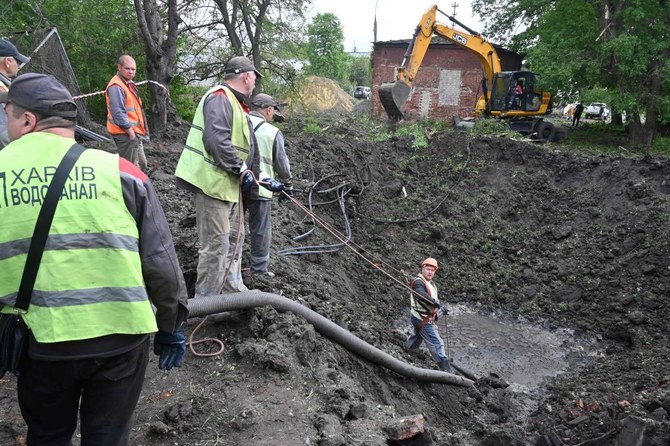
- The strikes were “in response to attempts by the Kyiv regime to damage Russian energy and industrial facilities“
- Ukraine has systematically targeted Russian oil refineries and other facilities in drone attacks in recent weeks
MOSCOW: The Russian Defense Ministry said on Saturday that its forces had carried out 35 strikes in the last week against Ukrainian energy facilities, defense factories, railway infrastructure, air defenses, and ammunition stocks.
It said in a statement that the strikes, which spanned April 20-27, were “in response to attempts by the Kyiv regime to damage Russian energy and industrial facilities.”
Ukraine has systematically targeted Russian oil refineries and other facilities in drone attacks in recent weeks, ignoring US requests not to do so.
Ukrainian officials said Russian missiles had pounded power facilities in central and western Ukraine on Saturday, increasing pressure on the ailing energy system as the country faces a shortage of air defenses despite a breakthrough in US military aid.
The Russian Defense Ministry said its campaign of strikes had been conducted using sea- and air-launched long-range precision weapons, including Kinzhal hypersonic missiles and drones.
It said it had also targeted and hit Ukrainian troop formations as well as what it described as foreign mercenaries.
Philippine capital’s financial center to become halal hub
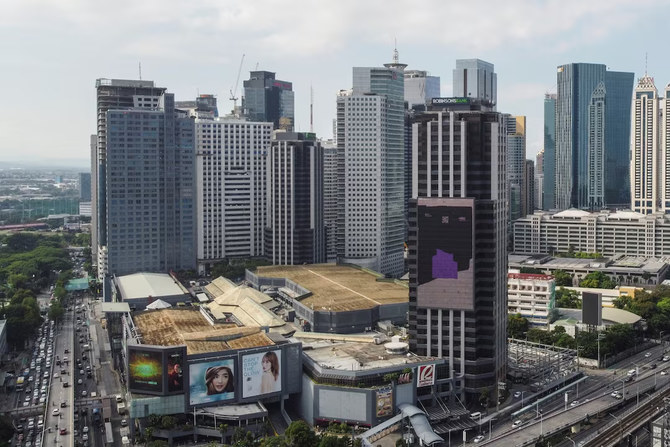
- Makati Halal Hub to act as a platform for manufacturers, traders and consumers
- Philippines’ central business district is perceived as trendsetter for other regions
MANILA: Philippine businesses in Makati City are joining hands with the Department of Trade and Industry to make the country’s financial center a halal hub, the head of the Philippine Chamber of Commerce and Industry’s Makati branch said on Saturday.
Makati City in Metro Manila is often referred to as the Philippines’ central business district. It has the highest concentration of banks and multinational and local corporations in the country. Foreign embassies are also based there.
The predominantly Catholic Philippines — where Muslims constitute about 10 percent of the nearly 120 million population — plans to raise 230 billion pesos ($4 billion) in investments and generate around 120,000 jobs by expanding its domestic halal industry by 2028.
The DTI signed on Friday a memorandum of understanding with PCCI Makati to join the government’s efforts to tap into the global halal market, which is estimated to be worth more than $7 trillion.
“To be able to implement its policies more effectively — such as the promotion and development of the country’s halal industry — they (the government) have to collaborate or strike a partnership with the business community or the businessmen who will be responsible in making this a reality,” PCCI Makati President Toots Cortez told Arab News.
“We can be the catalyst. We will begin by creating awareness, especially among the MSMEs (micro, small and midsize enterprises) because, according to the records of DTI, 99.5 percent of business in the Philippines are composed of SMEs.”
The agreement on establishing the Makati Halal Hub will position the city as a “central point for innovation and business in the halal sector, spanning a variety of industries including food production, financial services, and more,” the DTI said in a statement, as it expects the initiative to “provide substantial opportunities for Filipino entrepreneurs and international investors alike, fostering a robust economic ecosystem.”
According to the vision, the hub will act as a platform facilitating connections between manufacturers, traders, buyers, distributors and consumers in the halal sector.
“If we can group together and promote halal, I think that will be the best approach … You don’t need a big budget,” Cortez said.
“There are many Muslim embassies in Makati City, many restaurants and major establishments … Many tourists come to Makati, so if we can convince the establishments in Makati to be accredited as halal, that’s a good beginning from our side as a catalyst.”
He believes that the industry’s promotion in the city will make an impact as Makati is widely perceived as a trendsetter for other Philippine regions.
“The others, they follow the lead,” Cortez said. “They follow the lead on what’s happening in Makati City.”
US food regulator gathering information on Indian spices after alleged contamination
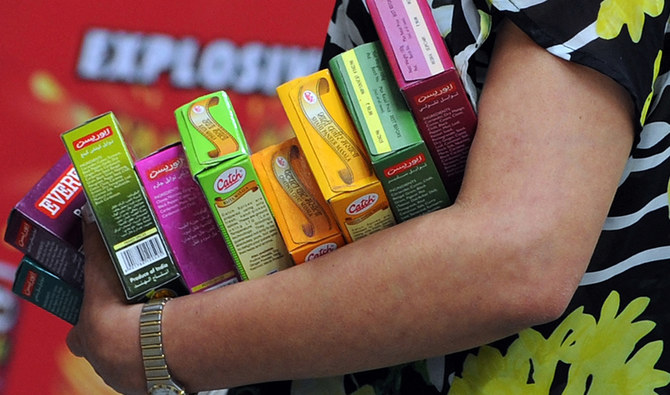
- MDH and Everest spices are among the most popular in India and are also sold in Europe, Asia and North America
- Hong Kong this month suspended sales of four MDH and Everest blends, while Singapore recalled Everest spice mix
HYDERABAD: The US Food and Drug Administration (FDA) is gathering information on products of Indian spice makers MDH and Everest after Hong Kong halted sales of some of their products for allegedly containing high levels of a cancer-causing pesticide.
“The FDA is aware of the reports and is gathering additional information about the situation,” an FDA spokesperson told Reuters on Friday.
Hong Kong this month suspended sales of three MDH spice blends and an Everest spice mix for fish curries. Singapore ordered a recall of the Everest spice mix as well, saying it contains high levels of ethylene oxide, which is unfit for human consumption and a cancer risk with long exposure.
Reuters is the first to report the US FDA’s review of alleged contamination of Indian spice products.
MDH and Everest did not immediately respond to Reuters requests for comment on this matter.
Everest has previously said its spices are safe for consumption. MDH has not responded to queries about its products so far.
MDH and Everest spices are among the most popular in India and are also sold in Europe, Asia and North America. India’s food regulator, the Food Safety and Standards Authority of India (FSSAI), is now checking the quality standards of the two companies, following the moves in Hong Kong and Singapore.
India’s Spices Board, the government’s regulator for spice exports, said on Wednesday it had sought data on MDH and Everest exports from authorities in Hong Kong and Singapore, and was working with the companies to find the “root cause” of the quality issues as inspections started at their plants.
In 2019, a few batches of MDH’s products were recalled in the US for salmonella contamination.



